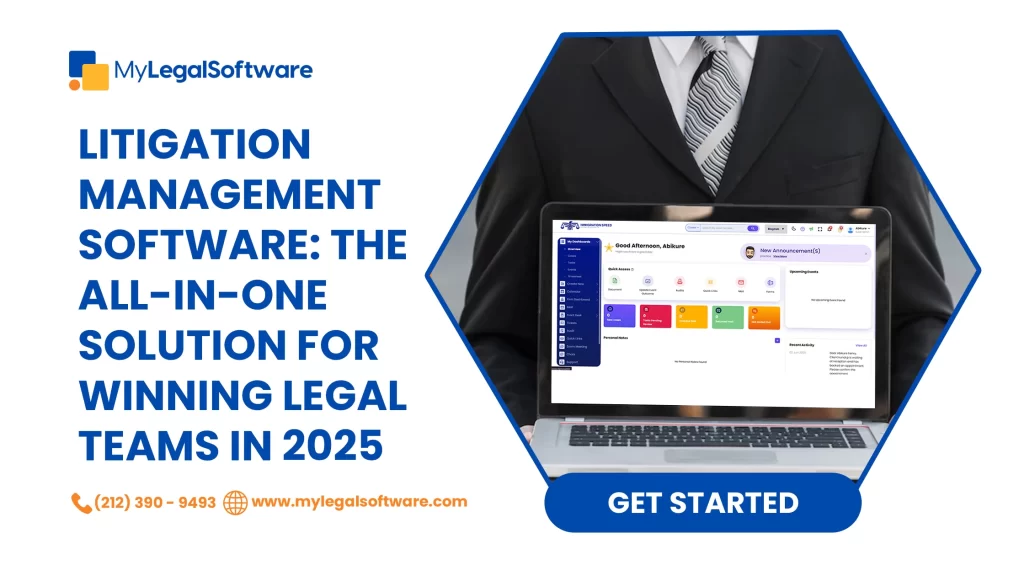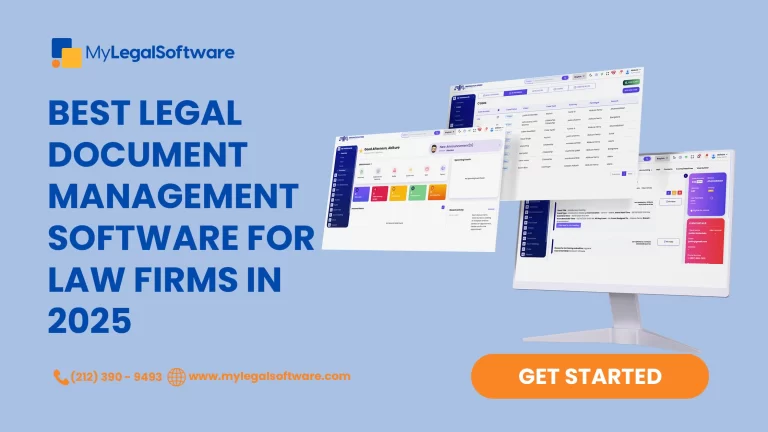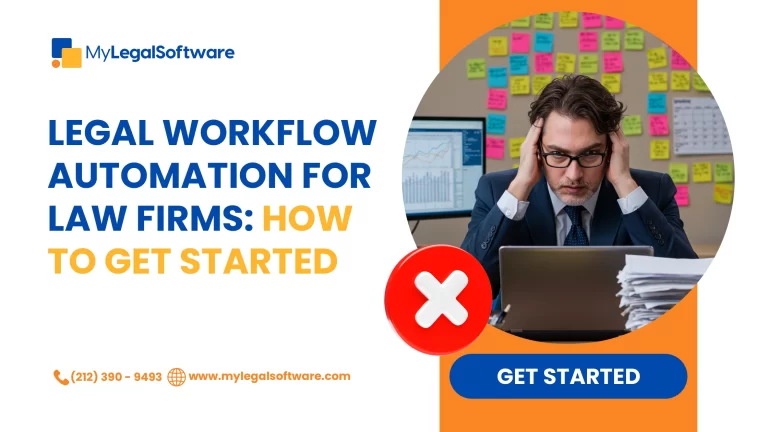Litigation has become more complex than ever. With tight court schedules, growing caseloads, and clients expecting faster results, law firms need tools that help them stay organized and ahead of the curve. And litigation management software helps with that.
More than just a digital filing cabinet, this software acts as your behind-the-scenes legal assistant, keeping everything in one place, reminding you of deadlines, managing documents, and making sure that you don’t miss anything.
Whether you’re a solo litigator or managing a large legal team, the right software can make your entire operation smoother and smarter.
What Is Litigation Management Software and Why Does It Matter?
Litigation management software is a specialized digital solution designed to help lawyers manage court documents, deadlines, discovery, and communication—all in one place. The software is tailored specifically for the rigorous and detail-heavy needs of litigation teams.
Over the years, manual litigation tracking has become increasingly inefficient and prone to costly errors. With rising caseloads, tighter court schedules, and evolving compliance rules, attorneys face more pressure than ever to deliver results quickly and accurately. Litigation software for attorneys eliminates chaos by centralizing documents, automating court deadlines, and streamlining communication across teams.
For solo practitioners and small firms especially, civil litigation legal software levels the playing field, allowing them to compete effectively against larger firms with deeper resources.
Essential Features of Litigation Software for Attorneys
A strong litigation management software platform should offer a comprehensive suite of features designed to support the end-to-end litigation process. Here are the core capabilities you should look out for:
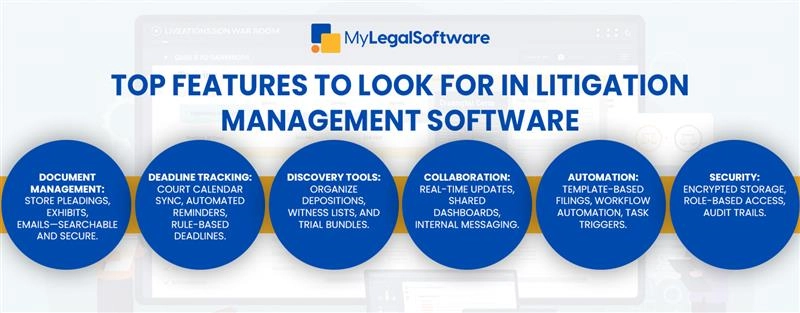
1. Document and Evidence Management
You want one secure place to store everything—pleadings, exhibits, motions, photos, emails. Good software lets you organize and access files instantly, with version control, so you never lose track of changes.
2. Case Tracking and Analysis
Litigation tracking software gives you an at-a-glance view of case progress, upcoming tasks, and how your team is performing. Some tools even offer built-in analytics and reporting.
3. Deadline and Court Management
Missed deadlines are costly. The right software keeps your docket synced with your calendar, sends automated reminders, and accounts for jurisdiction-specific filing rules.
4. Discovery and Trial Prep Tools
Discovery can get messy with dozens of depositions, documents, and schedules. Good litigation software helps you organize it all, manage witnesses, and prep trial bundles with ease.
5. Team Collaboration and Communication
Especially in civil litigation, teams need to work in sync. Software that supports real-time updates, internal messaging, and shared task lists ensures you’re not leaving any stone unturned.
6. Automation of Repetitive Tasks
From filing court documents to assembling trial packets, automation saves you time and effort. Look for tools that support templates, workflows, and even automated court bundle generation.
Benefits of Using Civil Litigation Legal Software
1. Better Operational Efficiency
With automated systems in place, attorneys can:
- Manage cases faster and with fewer manual steps
- Minimize human errors and redundancies
- Allocate time more effectively for high-value legal work
2. Enhanced Collaboration
Litigation teams work better when everyone is aligned:
- Shared dashboards offer instant insight into case progress
- Files and messages are accessible to all relevant parties
- Real-time updates ensure seamless communication
3. Lower Risk
Good litigation management software improves compliance by:
- Sending deadline alerts and ensuring jurisdictional compliance
- Creating audit trails for accountability and oversight
- Protecting data with encryption and access control
4. Cost Control
Better efficiency equals better savings. Civil litigation legal software helps by:
- Tracking legal expenses
- Reducing unnecessary overtime through automation
- Capturing more billable hours accurately
How to Choose the Right Litigation Tracking Software?
No two litigation management tools are exactly the same. Here’s what to consider before making a decision.
1. Your Firm’s Size and Needs
You need software that best serves your practice. If you’re a solo attorney, you want something simple and affordable. If you run a big litigation firm, you’ll need advanced collaboration tools, analytics, and scalability.
2. Integration Capabilities
Does it play nice with your existing tools (like billing systems or e-filing platforms)? Can it connect to Microsoft Office or Google Docs? Smooth integration saves time.
3. Security and Compliance
Make sure it has bank-level encryption, role-based access, and is compliant with industry standards. You’re handling sensitive data and don’t want to take avoidable risks here.
4. Cost vs. Value
Look at the total cost (including setup and training) and compare it to the time and stress it’ll save. A good platform should pay for itself efficiently.
Why MyLegalSoftware is a Great Litigation Management Tool?
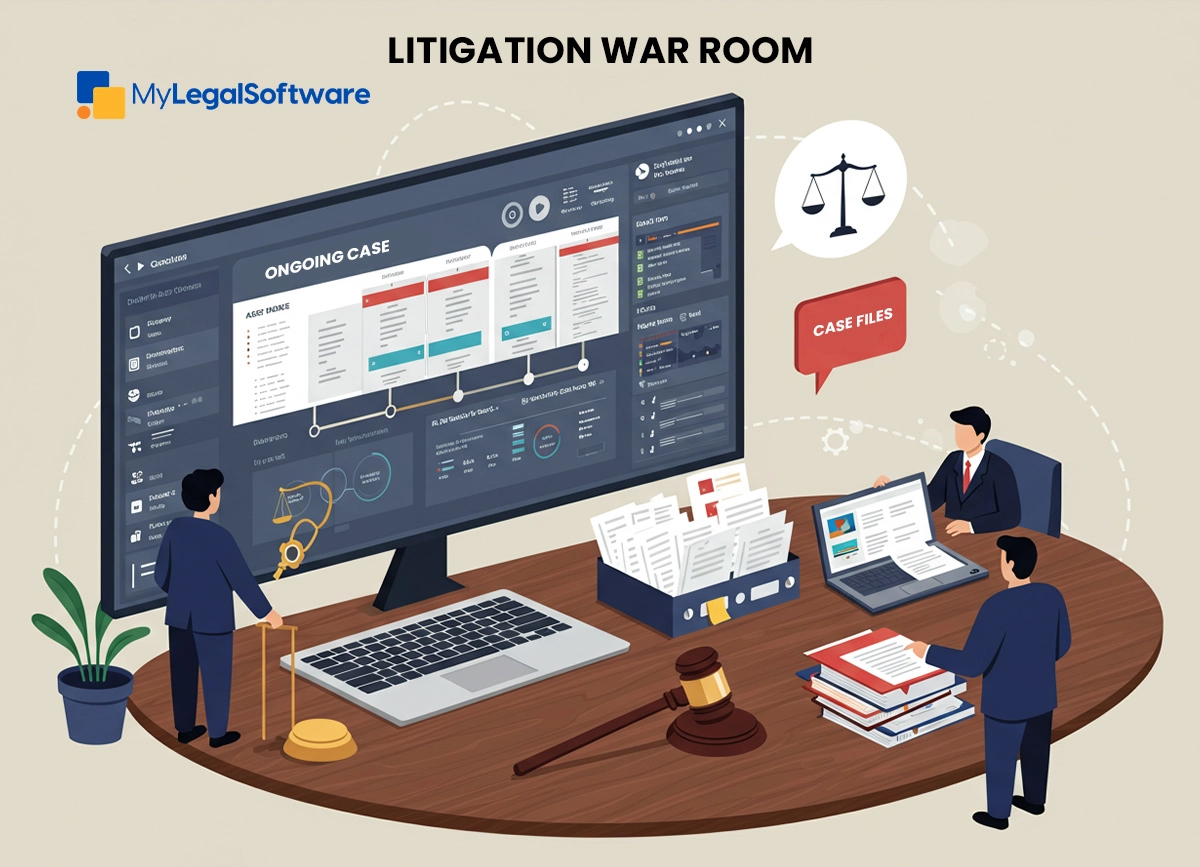
MyLegalSoftware (MyLS) delivers everything today’s litigators need in one powerful platform. With robust case management software capabilities, it covers the full litigation lifecycle—document handling, tracking, communication, and more.
Built with attorneys in mind, it supports complex cases with scalable tools for both solo practitioners and large firms. It also offers seamless lead generation tools—so you can grow your firm while managing cases like a pro. Plus, it’s secure, compliant, and easy to integrate with your existing tech stack.
Final Thoughts
Litigation is hard enough—don’t let outdated processes make it harder. With the right litigation management software, your firm can be more organized, more efficient, and more successful in court.
If you’re ready to streamline your litigation process and take control of your cases, check out what MyLegalSoftware has to offer. Explore the 14-day trial offer to see how MyLS is able to help your practice. It could be the best decision you make for your practice this year.
Frequently Asked Questions
What is litigation management software, and how does it work?
Is litigation software for attorneys suitable for small law firms?
How does litigation tracking software improve case outcomes?
Can litigation software automate document filing and trial prep?
Is cloud-based litigation software secure for sensitive case files?
It’s a digital tool that helps you manage documents, deadlines, and litigation workflows from one system.
Yes! Many platforms are designed to be affordable and scalable for solo and small practices.
It helps prevent missed deadlines, keeps teams aligned, and ensures better preparation for court.
Absolutely. Many platforms offer templates and automation for filings, motions, and trial documents.
Yes, as long as it uses strong encryption and meets industry security standards.

